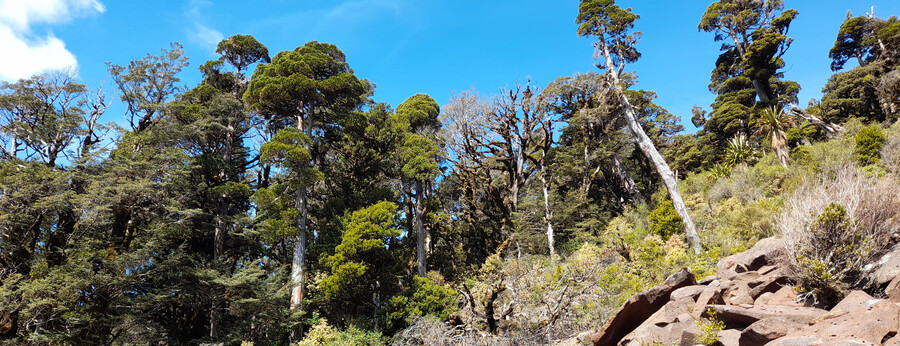 This collaboration has the potential to explain the "beech gaps" that have long puzzled New Zealand ecologists - the mysteries absence of beech forest from some parts of the country that appear climatically suitable.
This collaboration has the potential to explain the "beech gaps" that have long puzzled New Zealand ecologists - the mysteries absence of beech forest from some parts of the country that appear climatically suitable.
Associate Professor Chris Lusk is part of an international collaboration with researchers at the University of Canterbury, Monash University, and Centro de Investigación en Ecosistemas de la Patagonia. The focus of this collaboration is to understand why beech trees are absent from some parts of the world where they would otherwise be expected to be found. In Aotearoa, these "beech gaps" include Mt Taranaki, central Westland, and Stewart Island.
The southern beech trees (Nothofagus species) that dominate large areas of New Zealand’s native forests have close relatives in South America and Australia. A Kiwi traveller who knows their trees will probably have no difficulty recognizing the Chilean or Tasmanian relatives of our beech trees, but might be surprised by the different ways beeches interact with other tree species across time and space in those countries. Ecologists working in these three regions have come to different conclusions about the conditions that determine where southern beech trees grow best. How can this be?
Chris and his colleagues in New Zealand, Chile and Australia will test a new explanation for the divergent behaviour of southern beeches in these regions. Beech trees in all three countries share a special type of mycorrhiza (plant-fungus partnership) that distinguishes them from most other tree species in the temperate rainforests of the southern hemisphere. The fungi involved may be able to ‘hack’ the nitrogen cycle, giving beeches a nutritional advantage in some situations. However, we hypothesize that stoichiometric differences between the soils of New Zealand, Chile and Tasmania affect this type of mycorrhiza, determining whether beeches win or lose in competition with other tree species. By looking at the effects of climate and soils on this special relationship between beech trees and fungi, our collaboration will reveal previously undocumented influences on forest development hidden below ground.

Associate Professor
My current Marsden project is titled "Mycorrhizas, alternative st…